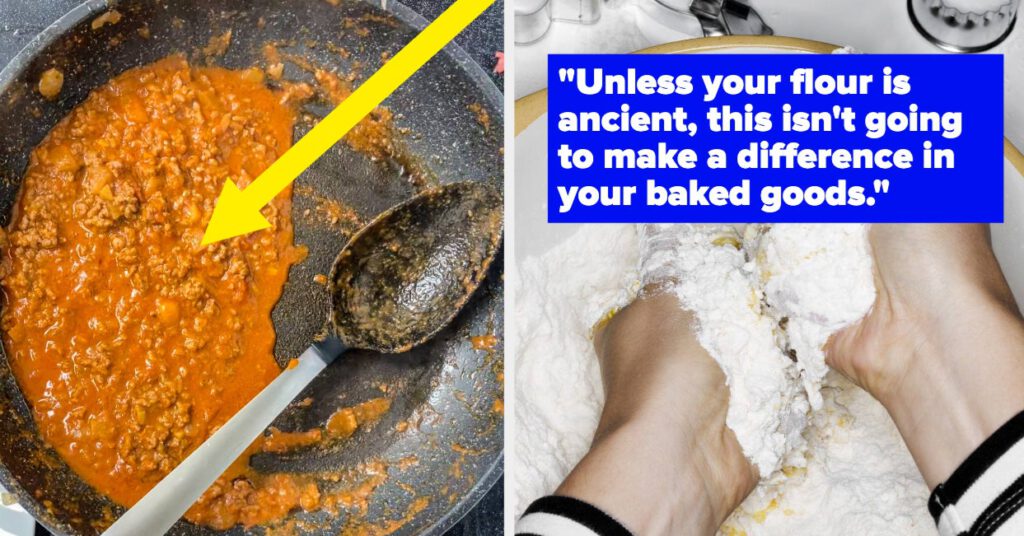“I know it isn’t the right way, but it’s good enough for me.”
People talk about plenty about cooking “rules” and best practices. But sometimes the best results come from getting a little creative in the kitchen. So Redditor u/Suspicious-Account-9 asked, “What is one cooking ‘rule’ that you choose to always ignore? Here’s what people said.
1.
“Most people throw out a whole block of cheese when there’s a little bit of mold on it. But when I find a touch of mold on any hard cheese, I’ll generally just chop off the chunk of mold with a knife and carry on enjoying the rest.”
2.
“When cooking ground beef, so many recipes tell you to ‘drain the fat.’ But I never do that. Fat is flavor. I use the rendered fat to cook up the rest of my ingredients like veggies. The end results taste so much better when cooked in beef fat.”
3.
“I always go heavier on herbs and spices than a recipe instructs. I think most recipes written for American audiences that originate from other countries cuisines are extremely stingy with herbs and spices. My Italian wife calls it ‘Italian Food for American People.’ These dishes taste bland. It takes a lot of experience to know exactly how to use herbs and spices properly, but anyone can start by just increasing the suggested amounts incrementally and seeing how it tastes.”
4.
“Steak ‘must be under-cooked’ according to all the hype, but I break this ‘rule’ often. I’ll eat my steak however I like it and however I’m craving it at the time: sometimes pink in the middle, sometimes cooked right through, but never extremely rare.”
5.
“While most recipes call for olive oil, I hardly ever use it. I don’t really see the point. It costs a lot more than other oils like canola and vegetable, and it has such a low smoke point. It’s way too easy to burn your food by cooking with it. I most often use a neutral oil like vegetable oil for cooking, and then I keep a nice bottle of olive oil on hand to drizzle on top of things as a garnish or to make marinades.”
6.
“If you cook with a Crock Pot or Instant Pot, most recipes say to sear or brown the meat before adding the rest of the ingredients. But honestly, I’ve tried searing the meat first plenty of times, and it’s not a noticeable enough difference in flavor to be worth the time effort. If I’m using my slow cooker, I am probably having a busy day and can’t be bothered.”
7.
“I’ve heard people say not to put tomatoes or any other acidic into cast iron, but my cast iron dutch oven is just fine after years of cooking Bolognese and other tomato-based dishes in it. Same goes for cooking with wine in cast iron.”
8.
“Salad dressing recipes love to tell you to ‘slowly mix in the oil’ while whisking. Nah, I just throw all the oil into a jar with the rest of the ingredients and give it a good shake. It always tastes good enough for me.”
9.
“I’ve heard that you should use only white wine in fish and chicken dishes as opposed to red wine. But that rule is begging to be broken. Just look at coq au vin.”
10.
“I always rinse mushrooms. That whole ‘wipe them gently with a paper towel’ stuff is total bullshit. Take two or three mushrooms, hold them under lukewarm running water and roll them around between your hands. Then set them on a rack to drain off any excess water. They basically scrub themselves.”
11.
“I know risotto is traditionally made with white wine, and it does, in fact, look better. But I often make risotto (like mushroom risotto) with a red wine. It elevates the flavor to something richer and even more satisfying.”
12.
“I eat raw cookie dough and cake batter without hesitation. While I understand that salmonella is a risk, it’s a pretty small one. I am willing to live dangerously when raw cookie dough is involved.”
13.
“Most pasta recipes tell you to bring a massive pot of water to a boil. If I’m eventually going to toss the pasta with a sauce of some sort, I almost always use way less water than called for — actually I use just enough to cover the uncooked pasta by two inches or so. This serves two purposes: First, the water will come to a boil much faster. Second, you’ll be left with some super starchy pasta water that’s perfect for helping each and every noodle cling onto all that luscious sauce.”
14.
“If a salad recipe says to tear large lettuce leaves, I go ahead and cut them. My lettuce always ends up staying just as fresh, crunchy, and delicious.”
15.
“Recipes will tell you to add the liquid slowly when making a roux from scratch, but personally, when making a sauce with a roux, as long as the roux is hot and the liquid is really cold, I add the liquid all at once with no fear of a lumpy sauce.”
16.
“People always say to never wash your cast iron skillets with soap, and they make sure a big deal out of it. Apparently that’s just an old rule from way back in the day when soap contained lye and other harsh stuff, and I believe it. Nowadays, a bit of soap isn’t going to hurt your cast iron. I wash mine with soap all the time and they’re doing just fine.”
17.
“When a recipe says to cook a piece of chicken whole, I almost always slice it before cooking it. Not only will it cook faster, but everything will cook at the same time. No more overcooked or dry pieces. I always butterfly the breast, pound it to equal thickness, and cut it into fillets. Otherwise, the small end of the breast will be overcooked and dry by the time the larger side is cooked. It’s an easy extra step, makes a huge difference taste-wise, and looks so much better when plated.”
18.
“I always, always use salted butter, even when a recipe calls for unsalted. I find that it just makes everything taste so much better, especially when used in sweet baked goods.”
19.
“I never use white pepper even when a recipe calls for it. I once bought ground white pepper for a recipe I was making (because white sauces ‘shouldn’t have black pepper’) and I still haven’t made a dent in it. I’d much rather just grind black pepper fresh when I want to use it. I don’t care if there are visible pepper flakes.”
20.
“I almost always add citrus like lemon or vinegar to dishes even when it’s not called for. Always. Add. Acidity. If there is one aha moment I’ve had in the last 20 years of cooking, it’s that when salt isn’t ‘helping’ a dish, what’s missing is acid. Lemon juice, vinegar, or citric acid (if you have some) transforms a dish in a surprising way. And honestly, it never hurts a dish, IMO.”
21.
“People talk a lot about making stock from scratch, but it’s time consuming. Instead of making my own homemade stock, I find that stock cubes (like Better Than Boullion) work just fine. They really taste great in most dishes…pretty much imperceptible from homemade stock IMO.”
22.
“I usually use dried herbs even when a recipe explicitly calls for fresh ones. I even grow fresh herbs on my windowsill, but I’ll still often prefer to use dried depending what I’m cooking. Unless you are cooking constantly, fresh herbs cost a lot of money and can go bad quickly (even if you use hacks to keep them fresh or chop them up and freeze them)”
23.
“I almost never properly measure dried spices. In fact, measuring ingredients in general has never been my strongest suit. For any of the spices I use while cooking a dish, a teaspoon is just a bit in my palm, a tablespoon is more than that, and anything less than a teaspoon is just a pinch. People always rave about ‘how well-seasoned’ my food is, and that’s because the use of dried spices is totally subjective.”
24.
“I don’t pay much attention to the type of onion I’m cooking with. When a recipe calls for an onion, I’ll pretty much disregard whatever color onion it ‘needs.’ I use whatever onion I have available, and I honestly don’t think it changes a dish all that much.”
25.
“Unless the flour you’re baking with is absolutely ancient or full of noticeable lumps, I really don’t think there’s any need to sift it each and every time you use it. Just make sure you’re thoroughly whisking it into your batter or dough, and there will be virtually no difference in the texture of your baked goods.”
26.
“No matter what the amount of garlic or vanilla a recipe calls for, I always use at least double or triple. It’s always a good idea.”
27.
“I ignore that old ‘rule’ that says don’t mix seafood and cheese. I can tell you plenty of instances where the two go together beautifully: “Parmesan crusted fish, cheesy garlic shrimp, lobster mac ‘n’ cheese, spaghetti and clams with garlic and Pecorino, etc.”
28.
“I crowd the pan nearly every time I make bacon, and it always comes out perfectly fine and delightfully crispy.”
29.
“I don’t gradually add one egg after the other and slowly beat them when baking. All the eggs and vanilla get tossed into the bowl and beaten at the same time, and you know what, it always turns out fine.”
30.
“I hear a lot of cooking snobs hate on jarred garlic. But minced garlic (the stuff in jars) is actually handy and tasty when used properly. I still use fresh garlic often, but I’ve gotten off my high horse about the other stuff and keep it on hand for lazy occasions.”
31.
“I never rinse off canned beans. Sorry, not sorry.”
32.
“Recipes tell you to cook risotto by adding the stock gradually and stirring little by little. But I’m here to say you can make a perfectly fine homemade risotto by putting in all the stock at once. And it just needs a few stirs, not all that constant attention.”
33.
“I’ve been thawing meat on the counter for 30 years and I’m doing perfectly fine. I don’t believe any of that “leave it in the fridge overnight” nonsense.”
Are there any cooking ‘rules’ that you choose to break in your home kitchen? Tell us in the comments below!




